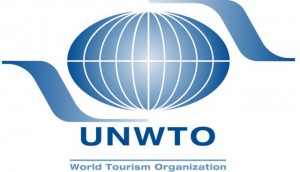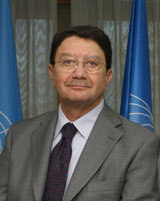UN World Tourism Day occurs every September 27th, the start of the tourism season in the southern hemisphere and the end of the tourist season in the northern hemisphere, and this year the theme is “Tourism and Sustainable Energy: Powering Sustainable Development.” Now, September 27th is a long ways away, so it  might seem a bit premature to write a blog post about the event; after all, you’ll all probably forget well before September rolls around! Well, I recently came upon an interview with Taleb Rifai, the Secretary-General of the UN World Tourism Organization about the goals of this year’s World Tourism Day and so I decided to bring them up now rather than bookmark the article and wait, especially since spring break season is coming up in just a couple weeks!
might seem a bit premature to write a blog post about the event; after all, you’ll all probably forget well before September rolls around! Well, I recently came upon an interview with Taleb Rifai, the Secretary-General of the UN World Tourism Organization about the goals of this year’s World Tourism Day and so I decided to bring them up now rather than bookmark the article and wait, especially since spring break season is coming up in just a couple weeks!
The main goal of this year’s World Tourism Day is to raise awareness of sustainable energy initiatives in tourism and how they work to combat climate change while reducing poverty. During the interview Rifai  mentions some of the challenges the all-inclusive model for resorts poses to responsible tourism, something I touched on in a post a few months ago. All-inclusive resorts provide most of the services and products tourists need during their stay, which can be detrimental to the host community. Local workers and businesses don’t benefit from this kind of tourism since the vacationers don’t spread money throughout the community by buying food, souvenirs, etc, but purchase things directly from the resort. Rifai suggests that the best way to integrate those types of resorts into the local community is to create policies which encourage resorts to hire local workers and use local products for building and consumption within the resort. The UNWTO recognizes that tourism can provide a lot of opportunities for Least Developed Countries (LDCs), but that is only true of the revenue reaches the host communities—if it stays with the resorts, many of which are run by transnational corporations, then it is a form of tourism leakage.
mentions some of the challenges the all-inclusive model for resorts poses to responsible tourism, something I touched on in a post a few months ago. All-inclusive resorts provide most of the services and products tourists need during their stay, which can be detrimental to the host community. Local workers and businesses don’t benefit from this kind of tourism since the vacationers don’t spread money throughout the community by buying food, souvenirs, etc, but purchase things directly from the resort. Rifai suggests that the best way to integrate those types of resorts into the local community is to create policies which encourage resorts to hire local workers and use local products for building and consumption within the resort. The UNWTO recognizes that tourism can provide a lot of opportunities for Least Developed Countries (LDCs), but that is only true of the revenue reaches the host communities—if it stays with the resorts, many of which are run by transnational corporations, then it is a form of tourism leakage.
Another focus issue for the UNWTO is respect for human rights in tourism. This isn’t an issue that I personally have written about—I tend to focus on the economic and political aspects of responsible tourism—but several of my colleagues here at the SISGI Group have written a lot about sex trafficking and exploitation, both of children and adults, and so it was interesting to see this issue come up in the interview. The UNWTO is currently working with a number of other UN agencies and NGOs to create initiatives that will hopefully eliminate child prostitution, child pornography, and child trafficking. They also created the international campaign “Don’t Let Child Abuse Travel,” which focuses specifically on tourism’s relationship to child exploitation.
I thought this was a very interesting interview, especially because it synced very well with things I have written  about in the past, particularly that sustainable tourism is not just an environmental issue but an economic issue, and I am glad that information about this year’s World Tourism Day is already starting to get out there. Every year the UNWTO picks a new theme for World Tourism Day and I really like this one, and I think it’s coming at a good time given the global economic climate. Tourist businesses are looking for ways to become more competitive and draw in more travelers, and focusing on responsible, sustainable initiatives is a good way to do so. I hope that you will continue to look for information about World Tourism Day in the coming months, and that you will celebrate it—perhaps by going on a sustainable vacation (or am I just looking for any excuse to travel)? After all, this day and the meaning behind it can’t exist in a vacuum; people need to talk about it and patronize sustainable tourism industries if other members of the industry are to have any incentive to change.
about in the past, particularly that sustainable tourism is not just an environmental issue but an economic issue, and I am glad that information about this year’s World Tourism Day is already starting to get out there. Every year the UNWTO picks a new theme for World Tourism Day and I really like this one, and I think it’s coming at a good time given the global economic climate. Tourist businesses are looking for ways to become more competitive and draw in more travelers, and focusing on responsible, sustainable initiatives is a good way to do so. I hope that you will continue to look for information about World Tourism Day in the coming months, and that you will celebrate it—perhaps by going on a sustainable vacation (or am I just looking for any excuse to travel)? After all, this day and the meaning behind it can’t exist in a vacuum; people need to talk about it and patronize sustainable tourism industries if other members of the industry are to have any incentive to change.


